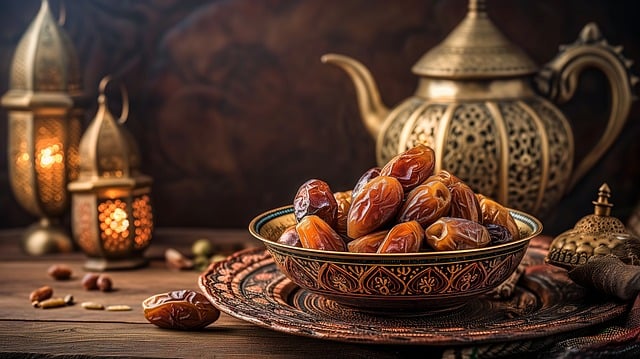Let the Countdown Begin: Celebrate Ramadhan’s Arrival on 3/12
Light Up Your Nights: Ramadan 2024 Shines Bright from 3/12

Ramadhan, the holiest month in the Islamic calendar, holds immense significance for Muslims around the world. It is a time of deep spirituality, self-reflection, and increased devotion to Allah. As the countdown to Ramadhan begins, it is crucial to understand the importance of this sacred month.
During Ramadhan, Muslims are required to fast from dawn until sunset, refraining from consuming food, drink, and other physical needs. This act of self-discipline and restraint serves as a means to purify the soul and draw closer to Allah. By abstaining from worldly desires, Muslims can focus on their spiritual growth and develop empathy for those who are less fortunate.
Fasting during Ramadhan also serves as a reminder of the blessings and abundance that Allah has bestowed upon us. It is a time to express gratitude for the sustenance we are blessed with and to remember those who struggle to find enough to eat daily. This reflection on our privilege encourages us to be more compassionate and generous towards others.
The act of fasting is not the only aspect of Ramadhan that holds significance. It is also a time for increased prayer, recitation of the Quran, and engaging in acts of charity. Muslims strive to engage in more acts of worship during this month, seeking to deepen their connection with Allah and earn His forgiveness.
Ramadhan is truly a month of spiritual renewal and rejuvenation. As the countdown to its arrival continues, let us prepare ourselves physically and spiritually to fully embrace the blessings and opportunities this sacred month brings.
The Countdown to Ramadhan
As the days pass by, the excitement builds up, and the anticipation for the arrival of Ramadhan intensifies. The countdown serves as a reminder that this blessed month is just around the corner, ready to bestow its spiritual blessings upon us.
The countdown to Ramadhan is not merely a numerical measure of time. It is a time of preparation, both physical and spiritual. Muslims start to adjust their daily routines to accommodate the changes that come with fasting. They wake up earlier for Suhoor, the pre-dawn meal, and plan their day to ensure they have time for prayer, reflection, and acts of worship.
Physically, it is important to prepare the body for the changes that fasting brings. It is advisable to gradually reduce the intake of caffeine and sugary foods in the days leading up to Ramadhan, as these can cause withdrawal symptoms during fasting. Eating balanced meals and staying hydrated during non-fasting hours also help to maintain energy levels throughout the day.
Spiritually, the countdown allows Muslims to mentally prepare themselves for the heightened devotion and spiritual growth that Ramadhan offers. It is a time to reflect on one’s intentions and set goals for personal improvement during this sacred month. Muslims are encouraged to engage in self-reflection, seeking forgiveness for past mistakes, and making a conscious effort to strengthen their relationship with Allah.
The countdown to Ramadhan serves as a reminder to seize the opportunity for self-discovery and spiritual enlightenment that this blessed month provides. It is a time to renew our commitment to faith and make the most of the unique blessings that Ramadhan brings.
Preparing for Ramadhan – Physical and Spiritual Preparation

As the countdown to Ramadhan continues, it is essential to prepare ourselves physically and spiritually for the month ahead. Taking the time to make the necessary preparations ensures that we can fully immerse ourselves in the spiritual journey that Ramadhan offers.
Physically, preparing for Ramadhan involves adjusting our eating habits to align with the fasting schedule. Gradually reducing meal portions and avoiding excessive consumption of sugary and fatty foods helps the body adapt to the changes in calorie intake during fasting. Additionally, staying hydrated by drinking plenty of water during non-fasting hours is crucial to maintain optimal health.
In terms of spiritual preparation, Ramadhan offers a unique opportunity for self-reflection and growth. Taking the time to assess one’s spiritual state and setting goals for personal improvement can greatly enhance the experience of this holy month. Engaging in increased acts of worship, such as prayer, Quran recitation, and supplication, helps to deepen our connection with Allah and strengthen our faith.
Furthermore, it is important to mentally prepare ourselves for the challenges and rewards that Ramadhan brings. Developing a positive mindset and embracing the spiritual significance of fasting allows us to approach the month with enthusiasm and gratitude. By understanding the purpose behind our actions and the potential for personal transformation, we can fully embrace the blessings of Ramadhan.
Preparing for Ramadhan, both physically and spiritually, ensures that we are ready to embark on this sacred journey of self-discovery and spiritual enlightenment. As the countdown to Ramadhan draws closer, let us make the necessary preparations to make the most of this blessed month.
Ramadhan Traditions and Practices

Ramadhan is more than just a month of fasting; it is a time of rich traditions and meaningful practices that Muslims around the world observe. These traditions and practices contribute to the overall experience of Ramadhan and help foster a sense of unity and connection among the Muslim community.
One of the most prominent traditions during Ramadhan is the daily breaking of the fast, known as iftar. Muslims eagerly await the call to prayer at sunset, signaling the time to break their fast with dates and water. This moment is often shared with family and friends, gathering around the iftar table to enjoy a meal together and express gratitude for the blessings of Ramadhan.
Another important practice during Ramadhan is the Taraweeh prayer. This is an additional prayer performed after the evening prayer, consisting of 8 or 20 units of prayer. Muslims gather at the mosque or pray at home, reciting portions of the Quran in congregation. This practice allows for a deeper connection with the Quran and an opportunity to seek spiritual solace.
Charity and acts of kindness are also integral to the Ramadhan experience. Muslims are encouraged to give generously during this month, whether it is through monetary donations, providing meals to those in need, or volunteering their time for charitable causes. The spirit of giving and compassion is heightened during Ramadhan, as Muslims strive to emulate the generosity of Prophet Muhammad (peace be upon him).
Additionally, seeking Laylatul Qadr, the Night of Power, is a significant practice during the last ten nights of Ramadhan. It is believed to be a night that is better than a thousand months, and Muslims engage in increased acts of worship, such as prayer, recitation of the Quran, and supplication, in hopes of attaining its blessings.
These traditions and practices not only add depth and meaning to the Ramadhan experience but also foster a sense of community and solidarity among Muslims worldwide. Embracing these traditions allows individuals to fully immerse themselves in the spiritual journey that Ramadhan offers.
Celebrating the Arrival of Ramadhan on 3/12

As the moon is sighted and the day of 3/12 approaches, Muslims around the world eagerly anticipate the arrival of Ramadhan. This blessed month is met with joy, excitement, and a sense of renewed commitment to faith.
The first sighting of the moon signals the beginning of Ramadhan, and it is a moment of celebration and gratitude. Muslims come together, whether it is at the mosque or in their homes, to offer special prayers, recite supplications, and express their happiness at the arrival of this sacred month.
The evening of 3/12 marks the first iftar, the meal that breaks the fast. Families and friends gather around the iftar table, rejoicing in each other’s company and sharing delicious traditional dishes. The atmosphere is filled with warmth, love, and a sense of togetherness as everyone comes together to break their fast and offer prayers of gratitude.
The arrival of Ramadhan also brings with it a sense of spiritual renewal and personal growth. Muslims take this opportunity to reflect on their lives, seek forgiveness, and make positive changes. It is a time to reconnect with Allah and reevaluate one’s priorities, fostering a sense of purpose and introspection.
Celebrating the arrival of Ramadhan on 3/12 is not only a time of joy and feasting but also a time of gratitude and devotion. It is a moment to reflect on the blessings of this sacred month and to embrace the opportunities it brings for spiritual growth and self-improvement.
Activities to Engage in During Ramadhan

Ramadhan is a month filled with opportunities for spiritual growth, self-reflection, and acts of worship. As Muslims embrace the arrival of this blessed month, there are various activities that they can engage in to make the most of the Ramadhan experience.
- Recitation of the Quran: Ramadhan is an ideal time to connect with the Quran on a deeper level. Muslims are encouraged to recite and reflect upon the verses of the Quran, seeking guidance and inspiration.
- Night Prayers: The Taraweeh prayers, performed after the evening prayer, offer a special opportunity for spiritual rejuvenation. Muslims can attend the mosque or pray at home, engaging in prolonged prayer and recitation of the Quran.
- Supplication and Dua: Ramadhan is a time when the gates of heaven are open, and supplications are readily accepted. Muslims can engage in heartfelt dua, seeking forgiveness, guidance, and blessings from Allah.
- Acts of Charity: The spirit of giving and generosity is heightened during Ramadhan. Muslims can actively engage in acts of charity, whether it is through monetary donations, providing meals to the needy, or volunteering their time for charitable causes.
- Voluntary Fasting: In addition to obligatory fasting, Muslims can engage in voluntary fasting, such as fasting on Mondays and Thursdays or the white days (13th, 14th, and 15th) of each lunar month. These fasts are believed to earn additional rewards and blessings.
- Reflection and Self-Improvement: Ramadhan offers a unique opportunity for self-reflection and personal growth. Muslims can take the time to assess their character, seek forgiveness for past mistakes, and make positive changes in their lives.
- Increased Worship: Engaging in increased acts of worship, such as additional prayers, recitation of the Quran, and remembrance of Allah, strengthens one’s connection with Allah and deepens the spiritual experience of Ramadhan.
By actively participating in these activities, Muslims can make the most of the Ramadhan experience and draw closer to Allah. Embracing these practices allows for personal growth, spiritual enlightenment, and a greater appreciation of the blessings of this sacred month.
Navigating the Challenges of Fasting During Ramadhan

Fasting during Ramadhan presents its own set of challenges, both physical and mental. As Muslims embark on this spiritual journey, it is important to be mindful of these challenges and find ways to navigate them effectively.
One of the primary challenges of fasting is managing hunger and thirst throughout the day. It is crucial to consume a balanced Suhoor meal before dawn to provide sustained energy throughout the fasting hours. Including complex carbohydrates, protein, and healthy fats in Suhoor meals helps to keep hunger at bay. Staying hydrated during non-fasting hours is equally important, ensuring that the body receives an adequate amount of water.
Fatigue and low energy levels can also pose challenges during fasting. It is essential to get enough rest and prioritize quality sleep during Ramadhan. Taking short naps during the day can help to combat fatigue and maintain energy levels.
Balancing physical activities and exercise during fasting hours is another challenge. While it is important to stay active, it is advisable to engage in low-intensity exercises, such as walking or light stretching, during fasting hours. Intense physical activities can lead to dehydration and exhaustion.
Managing cravings and food temptations can be mentally challenging during fasting. It is important to remind oneself of the spiritual purpose behind fasting and to focus on the rewards and blessings that come with it. Engaging in acts of worship, such as reciting the Quran or engaging in supplication, helps to divert the mind from food cravings.
Lastly, managing social activities and gatherings during fasting hours can be challenging. It is important to communicate with family and friends about the significance of Ramadhan and the challenges of fasting. Planning social activities during non-fasting hours allows for a balance between spiritual obligations and social interactions.
By being mindful of these challenges and finding effective strategies to navigate them, Muslims can make the most of the fasting experience during Ramadhan. Embracing the physical and mental hurdles that come with fasting allows for a deeper connection with Allah and a greater appreciation of the blessings of this sacred month.
Sharing the Joy of Ramadhan with Others

Ramadhan is not only a time of personal reflection and spiritual growth but also a time to share the joy and blessings of this sacred month with others. Embracing the spirit of generosity and compassion, Muslims actively engage in acts of kindness and charity, spreading the love and joy of Ramadhan.
One of the ways to share the joy of Ramadhan is through acts of charity. Muslims are encouraged to give generously during this month, whether it is through monetary donations, providing meals to the needy, or volunteering their time for charitable causes. By sharing our blessings with others, we can make a positive impact on the lives of those less fortunate and experience the true essence of Ramadhan.
Inviting others to iftar, the meal that breaks the fast, is another way to share the joy of Ramadhan. Muslims often open their homes and extend hospitality to family, friends, and even strangers during this month. Breaking bread together fosters a sense of unity and promotes a spirit of togetherness and compassion.
Additionally, Muslims can actively engage in acts of kindness and random acts of generosity throughout the month. Whether it is helping the elderly, feeding the hungry, or visiting the sick, these acts of kindness embody the teachings of Islam and reflect the true spirit of Ramadhan.
Sharing the joy of Ramadhan with others not only benefits those who receive our acts of kindness but also brings a sense of fulfillment and joy to our hearts. It reminds us of the blessings we have been bestowed with and strengthens our connection with Allah.
Ramadhan Reflections and Personal Growth
Ramadhan offers a unique opportunity for self-reflection, introspection, and personal growth. As Muslims immerse themselves in this sacred month, they embark on a journey of self-discovery and spiritual enlightenment.
One of the key aspects of Ramadhan is self-reflection. Muslims are encouraged to assess their character and seek forgiveness.




2 Comments